Choosing the right eCommerce platform is a monumental decision for any online business. Two giants WooCommerce vs Shopify, dominate the landscape: WooCommerce, the WordPress plugin, and Shopify, the dedicated software-as-a-service (SaaS) platform. But how do they fare when it comes to specific features and functionalities?
Let’s delve into the comparison pros and cons of WooCommerce vs Shopify and for each platform across key areas, helping you make an informed decision for your online venture.
Quick Pro Tips to Choose Best E-Commerce Platform:
Choose Shopify if:
- You’re a beginner with no coding knowledge.
- You need a user-friendly interface and drag-and-drop functionality.
- You prioritize seamless social commerce integration.
- You want built-in AI features for basic personalization.
Choose WooCommerce if:
- You need maximum flexibility and customization potential.
- You want access to a vast library of free and paid plugins.
- You prefer lower overall costs with more control over pricing.
- You have access to developers for advanced customization.
WooCommerce vs Shopify: Choose the best suitable platform in 2024 for your Online Businesses Weighing the Pros and Cons.
1. Headless eCommerce with Shopify and WooCommerce:
- Shopify: Shopify offers built-in GraphQL support, making headless eCommerce seamless. Developers can access the headless API and create custom front-end experiences with flexibility. However, this requires advanced technical skills and can be expensive for smaller businesses.
- WooCommerce: Headless options for WooCommerce exist, with Next.js integrations gaining popularity. While requiring more work compared to Shopify’s native solution,headless WooCommerce gives developers complete control over the front-end experience, catering to highly customized storefronts.
2. Shopify Plus vs WooCommerce Enterprise:
Comparison: WooCommerce vs Shopify
- Shopify Plus: Tailored for high-volume businesses, Shopify Plus offers dedicated account management, custom APIs, and enterprise-grade scalability. But the hefty price tag and limited plugin integrations might be drawbacks for smaller companies.
- WooCommerce Enterprise: This hosted WooCommerce extension provides similar features to Shopify Plus at a lower cost. However, customization options are less robust, and the reliance on third-party plugins can introduce compatibility issues.
3. Technical Difficulty for Both Platforms:
- Shopify: Shopify boasts a user-friendly interface, making it ideal for beginners with no coding knowledge. Drag-and-drop features and pre-built themes simplify store creation. However, advanced customization beyond Shopify’s default framework requires developer expertise.
- WooCommerce: Built on WordPress, WooCommerce inherits its complexity. While offering greater control and flexibility, setting up and managing a WooCommerce store requires some technical knowledge. Plugins can fill functional gaps, but installation and maintenance add to the technical burden.
4. Social Commerce Integration:
- Shopify: Shopify seamlessly integrates with major social media platforms like Facebook, Instagram, and TikTok. Built-in features like Shoppable Posts and Buy Buttons create smooth buying experiences directly from social media feeds.
- WooCommerce: Social commerce integration for WooCommerce depends on plugins. While options like WooCommerce Social Commerce and Facebook for WooCommerce exist, they add to the plugin bloat and can be less refined than Shopify’s native solutions.
5. AI-powered Personalization:
- Shopify: Shopify boasts built-in AI features like “Smart Recommends” and product filters, suggesting relevant products to customers based on their browsing history. However, advanced personalization like dynamic content or individual pricing requires third-party apps.
- WooCommerce: AI personalization for WooCommerce depends on plugins like OptinMonster or AI Conversion. While offering customization options, integrating and managing multiple plugins can be cumbersome.
6. Community-driven themes and plugins for WooCommerce:
- Shopify: Shopify offers a curated selection of high-quality themes and apps in its official store. While reliable, the options are limited compared to WooCommerce. Additionally, themes and apps can be expensive, especially for specialized functionalities.
- WooCommerce: The open-source nature of WordPress fuels a vast community of developers creating themes and plugins for WooCommerce. This translates to an immense library of free and paid options, catering to almost any need. However, quality and compatibility can vary, requiring careful research before choosing.
7. Shopify App Store vs WooCommerce Plugin Market:
- Shopify App Store: Shopify’s app store is tightly controlled, ensuring compatibility and quality. But the limited customization options compared to WooCommerce plugins can be a constraint. Additionally, apps often come with monthly subscription fees, increasing operational costs.
- WooCommerce Plugin Market: The WooCommerce plugin market is a wild west of options, offering immense flexibility. However, quality can be inconsistent, compatibility issues may arise, and managing numerous plugins can add complexity.
8. Mobile Commerce Optimization:
Mobile E-Commerce Features: WooCommerce vs Shopify
- Shopify: Shopify stores are inherently mobile-optimized, and native apps for iOS and Android provide a seamless mobile shopping experience. This ease of use can be a significant advantage for businesses targeting mobile-first customers.
- WooCommerce: Mobile optimization for WooCommerce requires specialized plugins. While options like WPtouch Mobile and iThemes Exchange Mobile Pro exist, they add to the plugin burden and may not integrate seamlessly with all themes.
9. Payment Gateway Options:
- Shopify: Shopify offers built-in support for over 100 payment gateways, including major players like Stripe and PayPal. However, transaction fees can be higher compared to WooCommerce, especially for international sales.
- WooCommerce: WooCommerce boasts over 80 payment gateway options, with additional extensions adding even more choices. This flexibility allows businesses to choose gateways with lower fees or cater to specific.
10. Migration from Legacy Platforms:
- Shopify: Shopify offers dedicated import tools for migrating data from various platforms like BigCommerce, Magento, and PrestaShop. While streamlined, these tools may not be comprehensive, requiring manual data adjustments. Additionally, migrating complex custom functionalities might require developer intervention.
- WooCommerce: Migrating to WooCommerce typically involves third-party plugins like Cart2Cart or WP All Import. These plugins offer more granular control over the data migration process, allowing for customization and handling complex structures. However, setting up and configuring these plugins can be technically demanding.
Bonus Points which help to choose Shopify vs WooCommerce
- Headless WooCommerce with Next.js: As mentioned earlier, Next.js offers a popular solution for building headless storefronts with WooCommerce. Its server-side rendering technology translates to faster loading times and improved SEO, while the React framework provides developers with powerful customization options. This combination can be ideal for creating unique and high-performing online stores.
- Shopify’s recent acquisition of e-commerce fulfillment platform Delivery: This move signals Shopify’s commitment to streamlining the entire e-commerce journey for its merchants. By integrating fulfillment directly into the platform, Shopify aims to simplify inventory management, shipping, and order tracking, potentially giving it an edge over WooCommerce in the future.
Pros and Cons of WooCommerce
Following are the pros and cons which help you out to make decision to choose WooCommerce or not.
Pros and Cons of Shopify
Following are the pros and cons which help out to choose the best suitable platform for your online business.
Why Innovata360 Solutions is Your All-in-One E-Commerce Partner.
Whether you’re a wide-eyed entrepreneur launching your first online store or a seasoned e-commerce pro seeking to scale new heights, choosing the right partner is crucial for your success.

At Innovata360 Solutions, we understand the intricacies of both Shopify and WooCommerce, allowing us to tailor the perfect solution to your unique needs and aspirations
The Comprehensive and Best E-Commerce Solutions for Startups:
- Guided Platform Selection: We’ll help you navigate the complexities of Shopify and WooCommerce, identifying the platform that best aligns with your budget, technical skills, and long-term vision.
- Seamless Setup and Migration: No tech headaches here! Our experts will handle the entire store setup process, including data migration from your existing platform, ensuring a smooth launch.
- Ongoing Support and Training: We’re your e-commerce mentors, providing ongoing guidance and training to empower you with the knowledge and confidence to manage your store effectively.
The Premium E-Commerce Solutions for Brands and Enterprise:
- Advanced Customization: Leverage our expertise to craft a bespoke e-commerce experience, whether it’s implementing headless architecture for ultimate flexibility or integrating cutting-edge AI features for personalized shopping journeys.
- Strategic Optimization: We’ll analyze your store’s performance, identify growth opportunities, and implement data-driven strategies to boost conversions and maximize your ROI.
- Unmatched Technical Support: Our team of seasoned developers is always on hand to tackle any technical challenge, ensuring your store runs smoothly and securely.
No matter your level of expertise, Innovata360 Solutions goes beyond simply setting up your store. We become your trusted partner, walking alongside you every step of the way to ensure your e-commerce journey thrives.
Our comprehensive suite of services includes:
- Marketing and Branding: Attract your target audience and build a strong brand identity with our expert marketing and branding solutions.
- Logistics and Fulfillment: Streamline your operations with our integrated logistics and fulfillment services, ensuring seamless order processing and delivery.
- Payment Gateway Integration: Accept payments securely and effortlessly with our expertise in integrating various payment gateways.
- Customer Support: Delight your customers with our responsive and efficient customer support services, fostering loyalty and positive word-of-mouth.



